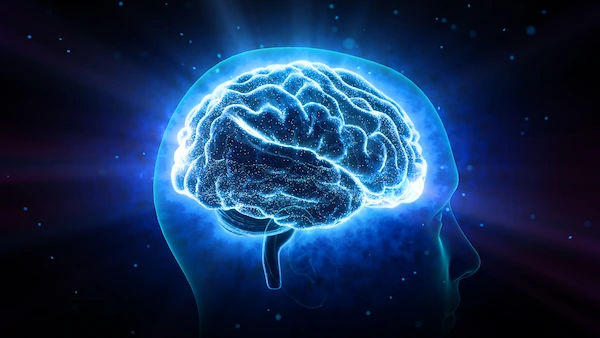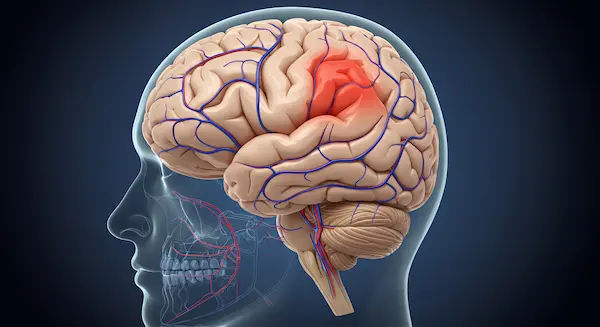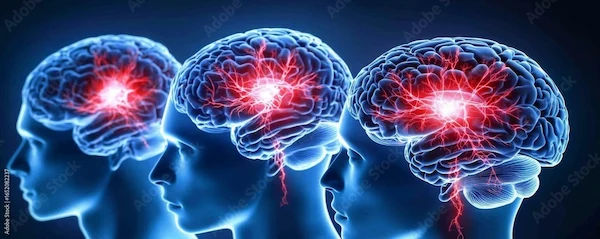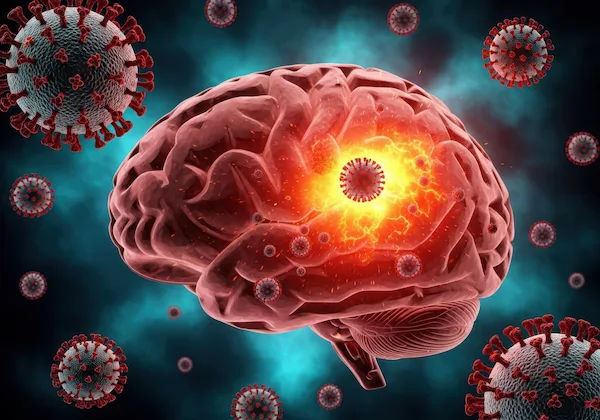Brain Haemorrhage Symptoms: A Life-Saving Guide
Learn the critical signs and symptoms of a brain haemorrhage, its causes, emergency actions, treatments, and prevention strategies to save lives.

Written by Dr. Shaik Abdul Kalam
Reviewed by Dr. Dhankecha Mayank Dineshbhai MBBS
Last updated on 13th Jan, 2026

Introduction
A brain haemorrhage is a medical catastrophe where every second counts. It occurs when a blood vessel in the brain ruptures, causing bleeding into the surrounding tissues. This bleeding compresses brain structures, deprives them of oxygen, and can lead to permanent damage or even be fatal. Recognising the signs of a brain haemorrhage is not just about knowledge—it’s a critical life skill. This guide will walk you through everything you need to know, from the unmistakable symptoms of bleeding in the brain to the subtle signs that are easy to miss. Our goal is to empower you to act decisively, potentially saving your own life or the life of someone you love.
What Exactly is a Brain Haemorrhage?
A brain haemorrhage, also known as a cerebral haemorrhage, intracranial haemorrhage, or haemorrhagic stroke, is a type of stroke caused by a burst artery in the brain. The leaked blood creates a haematoma (a collection of blood) that pools in the brain tissue. This build-up increases pressure inside the skull (intracranial pressure), which can damage delicate brain cells and disrupt blood flow to other areas of the brain.
The Different Types of Brain Bleeds
The brain is protected by layers of tissue and the skull. Where the bleeding occurs defines its type and severity.
Intracerebral Haemorrhage (Within the Brain)
This is the most common type of bleeding stroke, where bleeding occurs directly into the brain parenchyma (the functional tissue). It’s often caused by chronic high blood pressure, which weakens small arteries deep within the brain over time.
Subarachnoid Haemorrhage (On the Brain’s Surface)
This type involves bleeding into the subarachnoid space—the area between the brain and the thin tissues that cover it. A ruptured brain aneurysm (a weak, bulging spot in an artery) is a frequent cause. This often leads to a sudden, explosive headache.
Subdural & Epidural Haematomas (Between Brain and Skull)
These are often caused by head trauma. A subdural haematoma happens when blood collects between the brain and its durable outer covering (the dura mater). An epidural haematoma occurs when blood accumulates between the dura mater and the skull. Both are serious and require immediate attention after a head injury.
The Critical Warning Signs: Major Symptoms of a Brain Bleed
The symptoms of a brain haemorrhage can vary based on the location and severity of the bleed, but they often appear suddenly and violently.
Sudden and Severe Headache: The "Thunderclap"
Often described as the "worst headache of your life" or a thunderclap headache, this symptom is a classic hallmark, especially of a subarachnoid haemorrhage. It hits its peak intensity within seconds or minutes. Unlike a migraine, it doesn’t build up gradually.
Consult a Nephrologist for Personalised Advice
Neurological Symptoms: Weakness, Numbness, and Vision Problems
As the bleed affects specific parts of the brain that control motor and sensory functions, you may experience:
Sudden weakness or numbness in the face, arm, or leg, typically on one side of the body.
Partial or complete vision loss in one or both eyes, or double vision.
Difficulty swallowing.
Nausea, Vomiting, and Dizziness
Increased intracranial pressure can directly stimulate the brain’s vomiting centre, leading to severe nausea and projectile vomiting, often accompanied by intense dizziness and a loss of balance.
Seizures and Loss of Consciousness
A brain haemorrhage can irritate the brain’s cortex, triggering a seizure. In severe cases, the increasing pressure can lead to a rapid loss of consciousness, coma, or even death. This is a definitive medical emergency.
Subtle and Often Overlooked Symptoms
Not all signs of a brain bleed are dramatic. Some can be mistaken for less serious conditions, which is why they are dangerous.
Changes in Speech or Difficulty Understanding
You might experience slurred speech, an inability to form words correctly, or difficulty understanding what others are saying. This is a key component of the FAST acronym for stroke.
Loss of Balance and Coordination
A sudden lack of coordination, stumbling, or an inability to walk straight can indicate a problem in the cerebellum, a part of the brain that helps coordinate movement.
Altered Mental State: Confusion and Sleepiness
A person may suddenly become confused, disoriented, unusually sleepy, lethargic, or difficult to awaken. This is due to the brain’s overall function being impaired by the pressure and bleeding.
What Causes a Brain Haemorrhage?
Understanding the causes can help in both prevention and identification.
Head Trauma and Injury
This is the leading cause of brain haemorrhage in people under 50. A sudden impact, like in a car accident or a fall, can tear blood vessels in or around the brain.
Underlying Medical Conditions
High Blood Pressure (Hypertension): The chronic force of high blood pressure weakens artery walls, making them prone to rupture.
Cerebral Aneurysm: A weak spot in a blood vessel wall that balloons and can burst.
Arteriovenous Malformation (AVM): A tangle of faulty arteries and veins that can rupture.
Amyloid Angiopathy: A condition where amyloid protein deposits weaken blood vessels in the elderly.
Lifestyle and Other Risk Factors
Smoking, excessive alcohol consumption, and illicit drug use (especially cocaine).
Use of blood-thinning medications (anticoagulants).
Bleeding disorders and certain types of liver disease.
What to Do in an Emergency: Your Action Plan
If you or someone else exhibits any symptoms of a brain haemorrhage, your action is simple and critical:
DO NOT WAIT. Do not try to "sleep it off" or see if it gets better.
Call Emergency Services Immediately (e.g., 999, 102, 112). Say you suspect a stroke or brain haemorrhage. An ambulance is the fastest and safest way to get to a hospital, as paramedics can begin life-saving care en route.
Note the Time: When did the symptoms first start? This is crucial information for doctors.
Keep the Person Calm and Still. Do not give them anything to eat or drink.
How is a Brain Haemorrhage Diagnosed?
Upon arrival at the hospital, speed is essential. The primary diagnostic tool is a CT scan (Computed Tomography), which can quickly detect the presence of blood in the brain. In some cases, an MRI (Magnetic Resonance Imaging) may provide more detailed images. A neurological exam and possibly a cerebral angiogram (to view blood vessels) will follow to determine the exact cause and location of the bleed.
If you have a history of severe headaches, consulting a neurologist online with Apollo24|7 can be a good first step for evaluation and guidance on when to seek immediate care.
Treatment Options and the Road to Recovery
Treatment focuses on stopping the bleeding, removing the blood clot, and relieving pressure on the brain.
Medication: To control blood pressure, prevent seizures, reduce intracranial pressure, and reverse any blood-thinning effects.
Surgery: May be necessary to clip an aneurysm, remove an AVM, or drain the accumulated blood (craniotomy or minimally invasive surgery).
Rehabilitation: Recovery is a long process involving physical, occupational, and speech therapy to regain lost functions.
The prognosis depends heavily on the size and location of the haemorrhage, how quickly treatment was received, and the patient’s overall health.
Can a Brain Haemorrhage Be Prevented?
While not all brain haemorrhages are preventable, you can significantly reduce your risk by managing underlying conditions:
Control Blood Pressure: This is the single most important step. Monitor it regularly.
Quit Smoking and Limit Alcohol.
Wear Protective Gear: Always use seatbelts and helmets during appropriate activities.
Use Caution with Blood Thinners: If you are on medication like warfarin, require regular monitoring. Apollo24|7 offers convenient home collection for essential tests like INR (to monitor blood thinning), making it easier to stay on track with your health.
Conclusion
Understanding the signs of a brain haemorrhage empowers you to be a first responder in a crisis. This knowledge cuts through the panic and provides a clear course of action: act immediately. The sudden onset of a severe headache, especially when combined with neurological symptoms like weakness or confusion, should never be ignored. Your swift response in calling emergency services is the most critical factor in determining the outcome. While the event is frightening, modern medicine offers remarkable treatments. Prioritising preventive care, especially managing blood pressure, is your best defence. If you have risk factors and are concerned, don’t hesitate to consult a doctor online with Apollo24|7 for personalised advice and a proactive health plan.
Consult a Nephrologist for Personalised Advice
Consult a Nephrologist for Personalised Advice

Dr. Sanjay Maitra
Nephrologist
24 Years • MBBS, MD (Int. Med.), DM (Nephro)
Hyderabad
Apollo Hospitals Jubilee Hills, Hyderabad
(125+ Patients)

Dr Vinay Kumar A V
Nephrologist
8 Years • MBBS, MD - General Medicine, DM - Nephrology
Bilaspur
Apollo Hospitals Seepat Road, Bilaspur

Dr. Aswini Kumar Panigrahi
Nephrologist
23 Years • MBBS, MD (Int. Med.), DNB Nephro
Hyderabad
Apollo Hospitals Jubilee Hills, Hyderabad
(225+ Patients)

Dr S P Omkumar
Nephrologist
6 Years • MBBS, MD NEPHRO
Chennai
Apollo Clinic, Valasaravakkma, Chennai

Dr. Pardha Saradhi
Nephrologist
9 Years • MBBS, MD-DNB (Gen. Med.), DNB (Nephro)
Hyderabad
Apollo Hospitals D R D O kanchanbagh, Hyderabad
(75+ Patients)
More articles from Brain Injury
Frequently Asked Questions
Can you have a small brain haemorrhage and not know it?
Yes, it’s possible. A very small bleed might cause mild, transient symptoms like a minor headache or slight dizziness that resolves. However, even small bleeds can be a warning sign of an underlying condition like an AVM or hypertension that needs medical evaluation.
What is the difference between a brain haemorrhage and a stroke?
A brain haemorrhage is a type of stroke, specifically a haemorrhagic stroke. The other main type is an ischaemic stroke, which is caused by a clot blocking a blood vessel. Both are medical emergencies but have different treatment protocols.
What are the chances of surviving a brain haemorrhage?
Survival rates vary widely (from 30% to 60%) based on the bleed’s size, location, and how quickly treatment is administered. Quick medical intervention dramatically improves the odds of survival and reduces long-term disability.
How long can you live after a brain haemorrhage?
Many people go on to live full lives after a brain haemorrhage, though often with some lasting effects that require management. Long-term survival depends on the severity of the initial event, the success of treatment, the patient’s age, and their overall health post-recovery.
Can stress cause a brain haemorrhage?
Stress itself does not directly cause a brain haemorrhage. However, acute stress can cause a sudden spike in blood pressure (hypertensive crisis), which can, in turn, rupture an already weakened blood vessel in the brain and trigger a haemorrhage.




